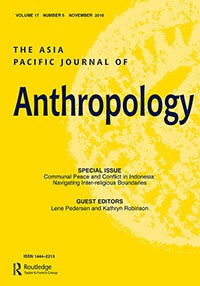Journals

The Asia Pacific Journal of Anthropology – Special Issue: Civilisation and Empire: Anthropology of China in Perspective (Vol. 13 No. 12)
| Author | : | LIANG Yongjia |
| Publication Date | : | Apr / 2012 |
| Publisher | : | Routledge, Taylor & Francis |
The revival of critical approaches to ‘civilisation’ in anthropology has led to a new dynamism in the work of several contemporary anthropologists of China (Dean 1998; Feuchtwang 2006, 2009; Fiskesjo 2006; Haaland 2010; Harrell 1995; Wang 2005, 2009). The revival has been in a sense inspired by Marcel Mauss’s (2006) rejuvenated theory of civilisation, Mauss’s concept of civilisation entails the spread of techniques technologies, practices, ideas and materials that are not under the effective control of a political and military power, and are intangible, unrecorded and pertinent to the social world. The theory is particularly instructive to the current conversation on ‘the global’, ‘the connected’, ‘the transnational’, already implied in Mauss’s writings.
Students of China, especially historians, are no strangers to the word ‘civilisation’. Vernacular concepts-‘sage-running’ (wangdao), ‘All-under-Heaven’ (tianxia), ‘official history’ (zhengshi), ‘five grades’ (wufu)-have long been analysed by historians who suggest China is a civilisation with an empire (Gernet 1982; Granet 1974; Needham 1954; Shaughnessy 2000). They identify various persistent ideas and practices that contribute to the formation and transformation of China: the priviledged status of the elite literati, the imperial exam system, the system of transportation and commu-nication, the synchronised sense of history, the moral responsibility of governance, the military expansion, the apparatus of containing tremendous ethnic and religious diversity, the spread of logographic scripts, myths, money, commercial goods, and fine arts, the tributary system, trade and diplomatic-marital relations and so on.
However, by the time anthropologists advanced into China, ‘civilisation’ had been abandoned as a concept in this discipline due to the demise of evolutionism and diffusionism. The anthropological study of China, dominated largely by British functionalism that emphasised the concepts of ‘culture’ and social structure’ (Guldin 1994), dismissed ‘civilisation’ as biased and turned to small-scale participant observation, certainly with sound reasons such as the empirical value of the data,the complexity of a single bounded locale, but which missed certain questions.
From ARI organized workshop “Empire, Civilisation and the Anthropology of China”, 4-5 March 2010.

